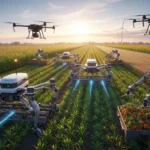Key Points:
- Gene editing technologies, notably CRISPR-Cas9, advance more precisely, offering transformative potential in various fields.
- In medicine, gene therapies are promising in treating genetic disorders and certain types of cancer, ushering in a new era of precision medicine.
- Gene technology’s impact extends to environmental conservation, with potential applications in ecosystem restoration and addressing climate change.
- Ethical considerations and regulatory frameworks are vital as gene technology evolves, ensuring responsible use and minimizing unintended consequences.
In biotechnology, significant strides are being made in gene technology, promising revolutionary breakthroughs with far-reaching implications for medicine, agriculture, and beyond. The convergence of cutting-edge research and technological innovation is poised to reshape the future, unlocking new possibilities and addressing complex challenges.
Gene editing technologies like CRISPR-Cas9 have been at the forefront of this transformative journey. These tools, which allow scientists to modify DNA sequences precisely, are increasingly refined and wielded with greater accuracy. Researchers are exploring their potential applications in treating genetic disorders, with ongoing clinical trials showcasing promising results.
In the medical arena, gene therapies are emerging as a powerful frontier. Breakthroughs in treating genetic diseases, including certain types of cancer and inherited disorders, are being realized. The ability to correct faulty genes or introduce therapeutic genes holds the promise of personalized and targeted treatments, heralding a new era in precision medicine.
Beyond healthcare, gene technology is making significant strides in agriculture. Developing genetically modified crops with enhanced traits, such as resistance to pests or improved nutritional content, contributes to global efforts to address food security challenges. Genetically modified crops can flourish in various environments and withstand unfavorable conditions, ultimately enhancing agriculture’s sustainability.
In the future, gene technology could redefine our approach to environmental conservation. Scientists are exploring genetic interventions to restore ecosystems, revive endangered species, and mitigate the impact of climate change. The prospect of genetically engineered organisms capable of breaking down pollutants or thriving in challenging ecosystems offers innovative solutions to environmental issues.
However, with the promise of gene technology comes ethical considerations and regulatory challenges. The potential for unintended impacts and the need for responsible governance loom large. Striking a balance between fostering innovation and ensuring ethical use is crucial as these technologies advance.





